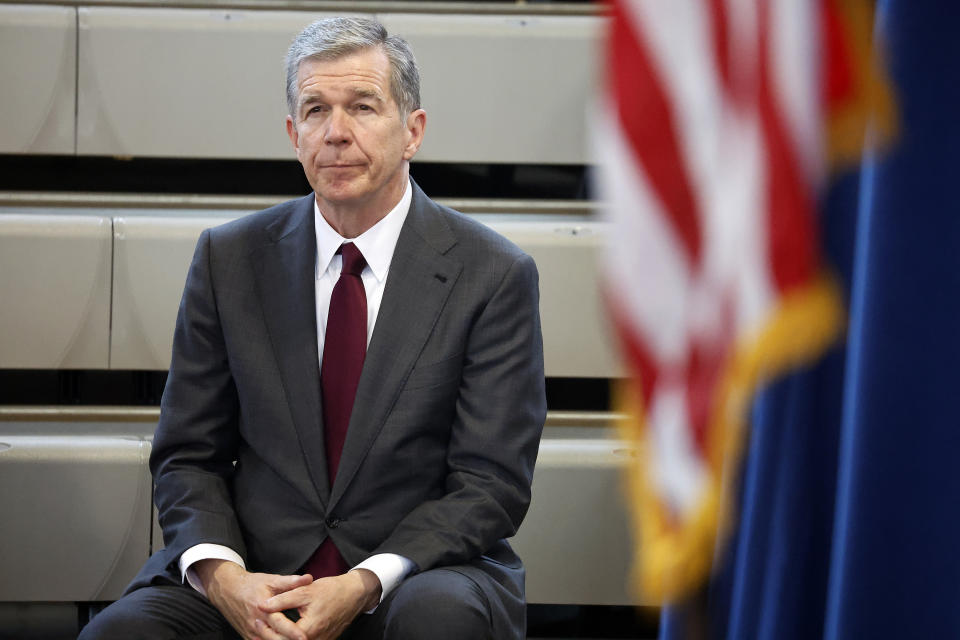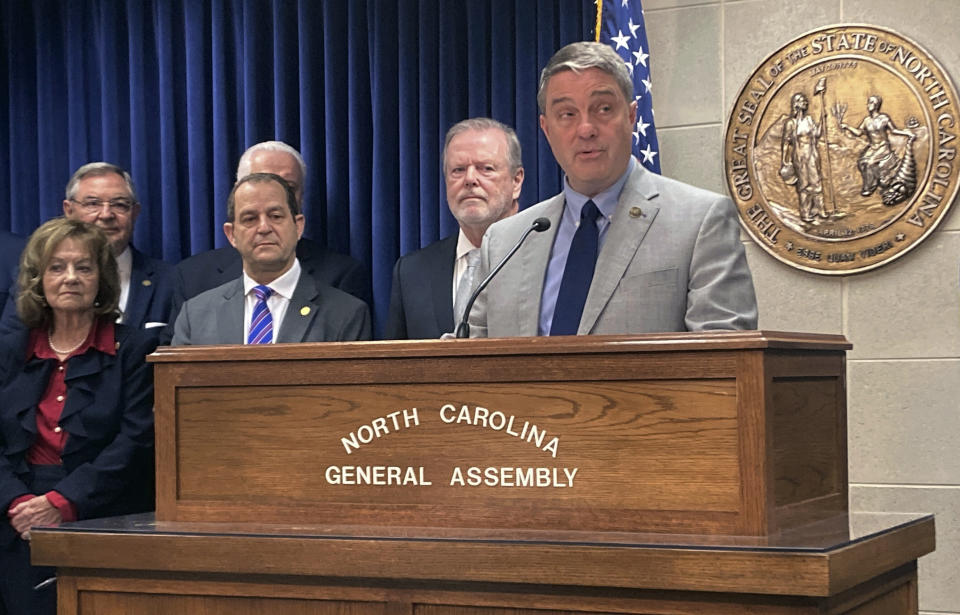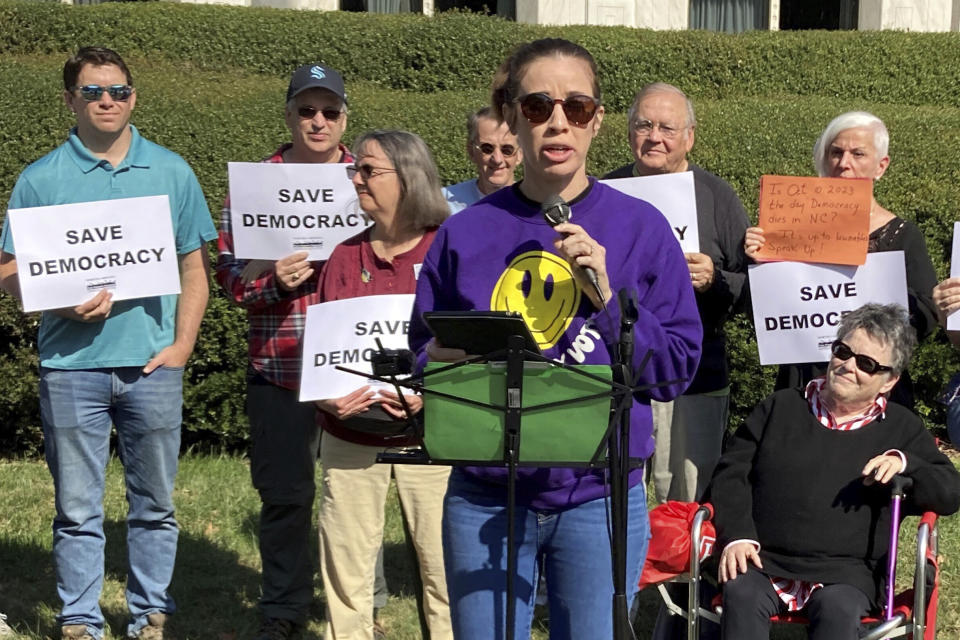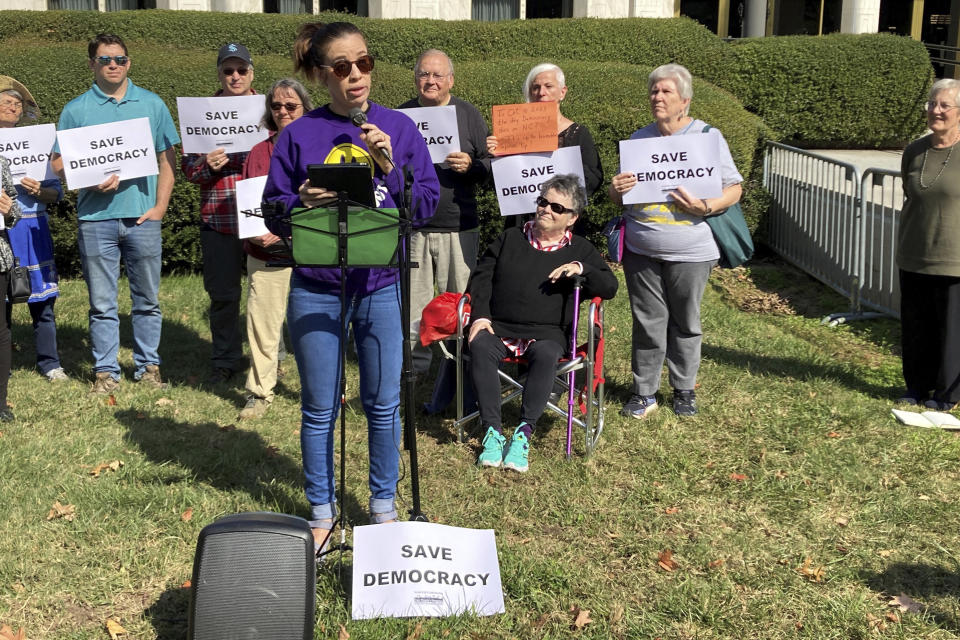North Carolina Republicans enact voting changes that weaken governor's ability to oversee elections
RALEIGH, N.C. (AP) — North Carolina Republicans enacted vote-count restrictions and weakened the governor's ability to oversee elections on Tuesday by overriding Democratic Gov. Roy Cooper's vetoes — setting in place electoral policies the GOP sought entering the 2024 elections in the likely battleground state.
In a series of votes, the narrow Republican supermajorities in the General Assembly overturned five Cooper vetoes, two of which address elections and voting in the ninth-largest state, where statewide races usually are very close. Cooper, fellow Democrats and others immediately filed lawsuits Tuesday challenging some of those laws.
The electoral changes are among a wave of GOP election laws and administrative overhauls also occurring elsewhere while former President Donald Trump, who seeks a return to the White House, has repeatedly made false claims that the 2020 election was riddled with fraud. While Trump won North Carolina’s electoral votes in both 2016 and 2020, Democrats see the state as a pickup opportunity for President Joe Biden in 2024. Voters also will choose a successor to Cooper, who can't run again next year due to term limits.
One new North Carolina law would eliminate the governor's power to appoint the State Board of Elections and give it to legislative leaders, while the other would end a three-day grace period to receive and count absentee ballots as long as they are postmarked by Election Day. Instead, these ballots will have to be received by the time in-person balloting ends at 7:30 p.m. on the date of the election to count.
These laws — years in the making after Cooper's previously successful vetoes or lawsuits blocked legislation with similar provisions — advanced this year thanks to Republican seat gains in 2022 elections and an April party switch by a House Democrat to the Republican Party.
North Carolina GOP legislators advancing the bills have not grabbed on to Trump’s grievances, but rather arguments that the legislation will promote bipartisan consensus in election administration and boost citizen confidence in elections.
“We must take commonsense steps to ensure that our elections are fair and free from perceived bias,” GOP Sen. Warren Daniel, a chief sponsor of the elections bills, said during Tuesday's debate.
But Cooper and his allies contend the election and voting legislation will wrongly give Republicans the upper hand in close results, intimidate voters and make it more difficult to cast ballots.
“Every single eligible voter deserves fair access to the ballot box and to have their vote count, and North Carolinians will not stand for this voter suppression," Cooper said in a news release announcing a federal lawsuit filed by the Democratic National Committee and state Democratic Party. It challenges the elimination of the grace period and other rule changes when someone both registers to vote and cast a ballot during the state’s 17-day early in-person voting period.
Republicans say that voters will be educated on the new absentee ballot deadline, which is similar to those in roughly just over half of the states. The deadline wouldn’t apply to military or overseas ballots.
A similar federal lawsuit challenging the same-day registration rule — in particular a less-forgiving standard on an address verification notice that must be successfully delivered by mail for the registrant's vote to count — also was filed by voting-rights groups and college students on Tuesday, with the assistance of lawyers that often back Democratic interests.
House Speaker Tim Moore told reporters that the legislation approved Tuesday “is the correct public policy (and) that it’s on solid legal ground.”
The state elections board has been five members, with the governor’s party historically holding three of the seats. Beginning Jan. 1, the board will be eight members, chosen by legislative leaders from both major parties and likely creating a 4-4 split among Democrats and Republicans.
“Our current board structure allows the party of the governor, whichever party that is ... to manipulate the system," Senate Majority Leader Paul Newton said.
Critics say these changes will lead to board impasses that could scale back the number of local early in-person voting sites and could send the outcomes of contested elections to the courts or the General Assembly to settle.
“This bill does the opposite of what it says it will do — it will actually make the administration of elections more partisan, not less partisan,” said Rep. Allen Buansi, a Democrat.
The law says the new state board also would have until Jan. 10 to decide whether to keep current state elections Executive Director Karen Brinson Bell on the job or hire someone else. If the board can’t decide, the decision would fall to Republican Senate leader Phil Berger.
Republicans were unhappy with Brinson Bell — hired by the Democratic-majority board in 2019 — for her role in a legal settlement that extended in 2020 the time for mailed-in ballot envelopes postmarked by the election date to be received and counted from three days after the election to nine days.
The omnibus measure also prohibits officials from accepting private money to administer elections, and directs state courts to inform elections officials about potential jurors being disqualified because they aren’t U.S. citizens, so they can then be removed from voter rolls.
Another new law with Tuesday’s successful overrides scales back or eliminates authority from Cooper and future governors to appoint members to several other boards and commissions, giving those choices instead to the General Assembly, its leaders or other elected officials. Cooper announced that he also sued in state court Tuesday over this law, saying the changes illegally interfere with a governor's executive powers.
The other two measures whose vetoes were overridden Tuesday were an energy bill designed to encourage nuclear energy production and the legislature’s annual “regulatory reform” measure.
___
Associated Press/Report for America writer Hannah Schoenbaum contributed to this report.





